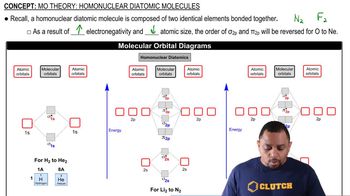Here are the essential concepts you must grasp in order to answer the question correctly.
Hydrogen Bonding
Hydrogen bonding is a type of attractive interaction that occurs between a hydrogen atom covalently bonded to a highly electronegative atom (like oxygen or nitrogen) and another electronegative atom. In 1,3-propanediol, hydrogen bonds can form both intramolecularly (within the same molecule) and intermolecularly (between different molecules), influencing the compound's physical properties and reactivity.
Recommended video:
Intramolecular vs. Intermolecular Forces
Intramolecular forces are the forces that hold atoms together within a molecule, while intermolecular forces are the forces that occur between different molecules. Understanding the distinction is crucial for analyzing molecular behavior, as intramolecular hydrogen bonds can stabilize a molecule's structure, whereas intermolecular hydrogen bonds can affect boiling points and solubility.
Recommended video:
Intermolecular vs Intramolecular Forces
Structural Representation of Molecules
The structural representation of molecules, such as Lewis structures or skeletal formulas, provides a visual understanding of how atoms are arranged and bonded within a molecule. For 1,3-propanediol, drawing the structure with an intramolecular hydrogen bond helps illustrate how the molecule can fold upon itself, allowing for the formation of these specific interactions, which are key to its chemical behavior.
Recommended video:
Homonuclear Diatomic Molecules




